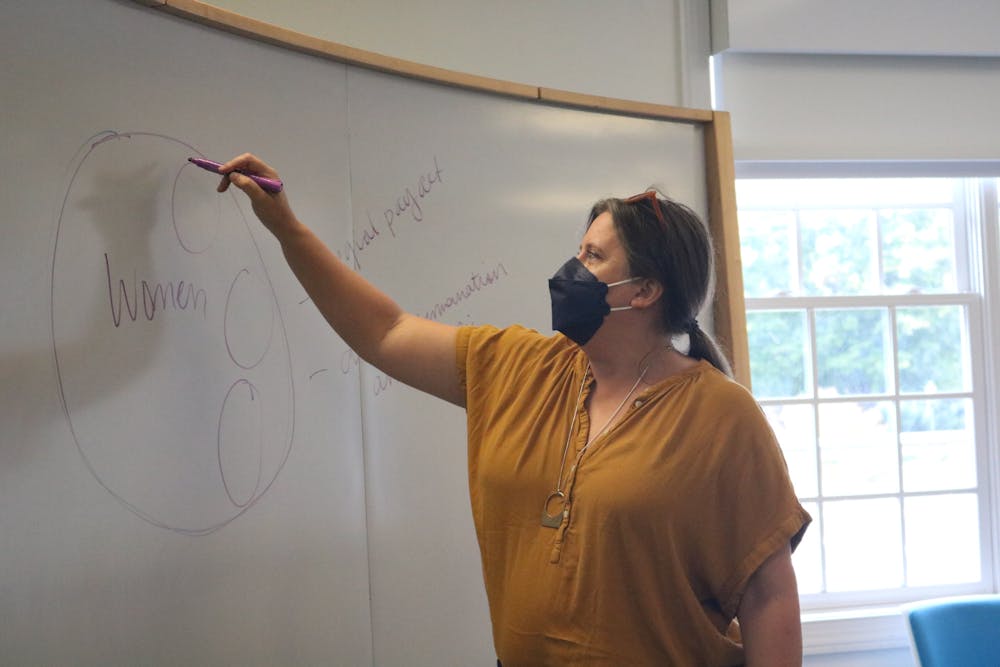Freshman Julia Swartz considered herself to be a fairly open-minded person before coming to Elon. Yet when Swartz decided to take WGS 1100: Sex and Gender Studies course her first semester, she found her perspective challenged in ways she hadn’t considered.
The class focused on applying their learning through the art of crafting zines. Based on Swartz’s Jewish background, she was inspired to make zines about how Orthodox Judaism treats women, a concept that she was never able to express in a classroom setting. Through this, she was exposed to historical and modern feminists from various backgrounds — something she hadn’t learned about until coming to Elon.
“We were constantly working on trying to use our knowledge to educate others rather than internalize our knowledge,” Swartz said.
Her class was mainly taught through discussion. Some conversations were straightforward, others more difficult to have. But, Swartz said this class was the epitome of teaching diversity within education.
WGS 1100 fulfills Elon’s new advancing equity requirement which are classes that help promote diversity, equity and inclusion within an educational setting.
Jennifer Eidum, professor of English, teaches Globalization of Hip Hop during Winter Term and counts as an AER credit.
“I think that it’s really important that Elon has created this requirement because a lot of faculty are engaging with these questions of diversity, equity, anti-racism, anti-colonialism and so on,” Eidum said.
The class highlights the impact hip hop has had on different communities. Eidum said some of her main points of discussion are the influence of hip hop on the Black community within the United States and on a global scale.
“I fill in the gaps to give them that story of hip hop in the United States and then very quickly, I bring them international to understand those global transactional flows of hip hop,” Eidum said.

In this class, Eidum also said that she focuses on the history and pillars of hip hop which are emceeing, DJing, breakdancing, graffiti and knowledge.
Eidum said she assigned an important multimodal project for her students and she said she loves how invested the students get when presenting. One of her students went above and beyond and brought in DJ equipment and started creating some samples while explaining the concept of copywriting.
At Elon, five AER classes focus on topics such as black history, culture and community and about race in general. Many of these classes are taught by white professors, something some Black students are disappointed in.
Freshman Mera Adams said she took COR1100: The Global Experience last semester, which focused on Black jazz and blues with Professor Ryan Johnson, a white professor.
Adams said that being the only Black student in her class made her feel seen, yet it also made her feel uncomfortable at times. She said that she felt pressured to stand out and do thorough research on what they were discussing that day in order to ensure to her peers that she knew what she was talking about.
“It’s confusing that there is not a Black person teaching about blackness,”Adams said.
Adams said that she loved her professor, but she thinks that students could really benefit from classes about Black history, culture and more being taught by a Black professor.
“I feel like if it was taught from a black perspective, they could give experience from their own, not through somebody else,” Adams said.
Adams said she wants professors to do more than just teaching students, but actually share why this information matters. Adam said that she wants her peers to understand that there is a reason for learning all of this and it is so much deeper than just teaching diversity, equity and inclusion; it is also about having an open mind.
Eidum said she recognizes her privilege and is dedicated to educating students on why Black history within education matters.
“As a white professor at a PWI in the south, and someone who is dedicated to anti-racism and racial equity, I know that the only way to do the work is to do the work,” Eidum said. “So I accept my mistakes along the way and I really constantly educate myself to do it better.”
Eidum said she has taught the class three times and each time she is improving. She said going to workshops hosted by the Center for Race, Ethnicity and Diversity Education and the training provided to professors for teaching an AER course has been helpful. One thing Eidum said she learned from the AER course training was identity mapping which is an activity that helps students figure out what influences and makes up their identities.
“Now in class, we do identity mapping and talking about our own intersectional identities, so when we talk about race in the classroom, we have that foundation and we understand sort of who’s in the room,” she said.
Eidum also said the AER credit came out of the student’s request and it helps motivate faculty who are already having these discussions to teach better. However, she pointed out that it could help faculty members to pursue this endeavor and get more involved in diversity, equity and inclusion topics.
“Being able to find these spaces that are so privileged, to notice that area is so privileged and then to find ways to invite others in is just so important for students being seen,” Eidum said.
Coming from a white-privileged background, Swartz emphasizes the need to have these classes in our society.
“Although we don’t necessarily see much diversity on campus, I think at least teaching it is something we could do to increase the diversity that we have,” Swartz said. “As a white student, I’m not someone who has experienced much oppression in my life, but that doesn’t mean I can’t learn about it and be on the right side of things.”


